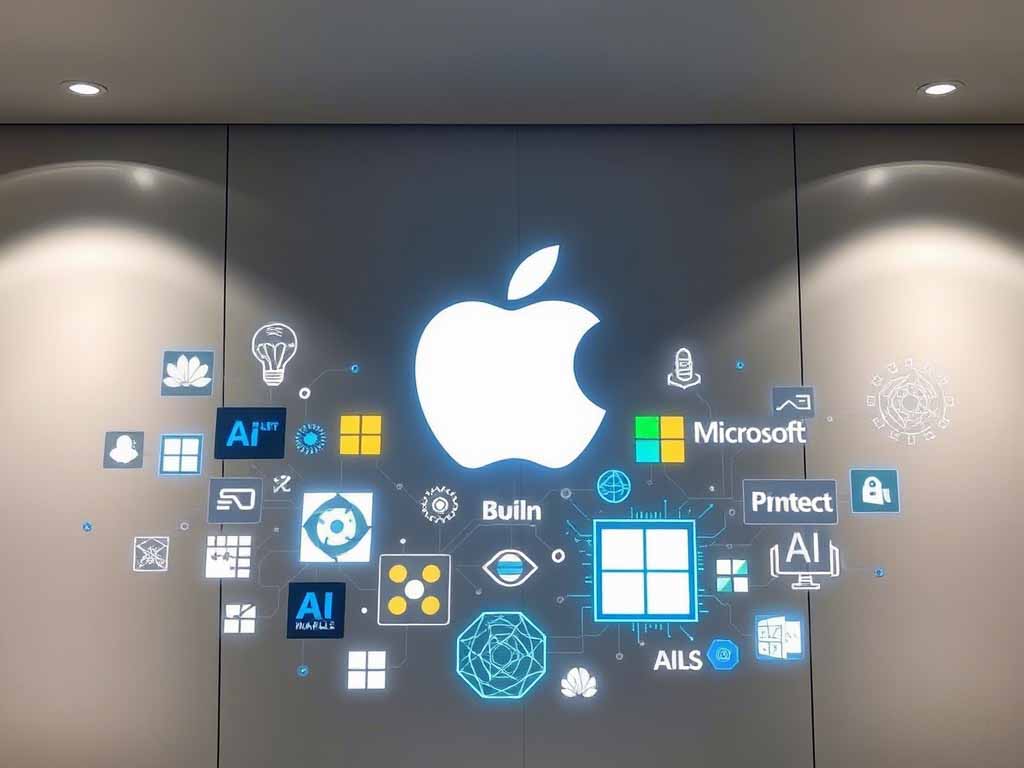You’ve probably noticed something strange if you’ve been watching the tech world lately. No, it’s not another chatbot launch or viral robot video. It’s quieter than that — but maybe even more important:
Big companies are buying up small AI startups like there’s no tomorrow.
Not a few here and there. I’m talking dozens in just the past couple of months. Apple, Salesforce, Microsoft — you name it — they’re all on a buying spree.
So what’s going on? Why the sudden rush? And what does this mean if you’re someone building, learning, or just plain curious about AI?
Let’s take a real look at what’s happening, minus the hype.
What’s Happening Right Now? A Quick Rundown
This past week alone, we saw:
- Apple announcing a major partnership with Hugging Face. That’s a huge shift for Apple, a company that rarely does public partnerships.
- Salesforce dropped around $450 million to acquire Reka AI, a lesser-known startup building advanced enterprise chatbots.
- Cohere launched a new API focused on non-English AI language models — signaling global expansion as a key priority.
- Google? Rumors are swirling about them quietly acquiring a stealth-mode robotics+AI firm based out of Montreal.
- Nvidia is not buying, but investing heavily in AI-adjacent startups, especially those blending software with robotics.
These aren’t isolated moves. They’re part of a much bigger trend — and it’s gaining momentum fast.
Why Are Big Companies Buying, Not Building?
You might be wondering: Why wouldn’t companies like Apple or Salesforce just build these tools themselves?
Great question.
Here’s the deal: building truly useful AI tools — especially ones that work well in the real world — takes a long time. You need data, smart people, clean code, and lots of testing. Even then, it might flop.
So instead of starting from scratch, big companies are doing something smarter: they’re buying startups that already figured it out.
Think of it like buying a finished puzzle instead of spending months trying to put the pieces together.
It’s faster. It’s less risky. And in a world where AI is moving at lightning speed, fast matters.
What Does This Mean for You?
This wave of AI acquisitions isn’t just about billion-dollar deals behind closed doors. It has real implications — especially if you’re a creator, developer, student, or someone launching something new.
If You’re a Builder
This is your moment. Seriously. You don’t need to create the next OpenAI to be successful. Build something small, useful, and niche — like AI tools for artists, teachers, farmers, or podcasters. If it solves a real problem, you’ll get noticed.
The bar isn’t size — it’s utility.
If You’re a Student
Start paying attention to who’s building the tools you use. And more importantly, who owns them. Because ownership shapes what tools can do (and what they won’t).
It also means AI fluency will be critical no matter your major — not coding, but understanding how AI is shaping your field.
If You’re Working at a Startup
Prepare for change. These acquisitions mean your company might get bought. Or your competitors might. That could mean new resources — or new pressure.
Now’s the time to level up your skills, learn some basic product strategy, and think about what your role might look like after a buyout.
If You’re Just Watching
No problem. Even just following these shifts gives you insight into where AI is really going — beyond the headlines. Acquisitions tell you where the real value is being built.
The Global AI Boom: Not Just Silicon Valley
One of the most exciting things about this trend? It’s not just happening in the U.S.
Check this out:
| Region | Recent Movement | What It Shows |
|---|---|---|
| 🇨🇦 Canada | Montreal-based AI labs getting snapped up | North America’s next AI hub |
| 🇮🇳 India | AI startups in education & healthcare booming | Local problems = global solutions |
| 🇪🇺 Europe | Hugging Face (France) gets big-name partners | Privacy-focused, open-source AI is in demand |
| 🇸🇬 Singapore | Enterprise AI tools getting regional VC interest | Southeast Asia is becoming a testbed for scaling |
So if you’re not in San Francisco or New York — that’s actually great news. This AI wave is spreading, and local markets are starting to matter just as much as the big hubs.
The Human Side of the AI Wave
Let’s take a breather and look beyond the numbers for a second.
What’s happening here is bigger than business strategy. It’s about the kind of AI world we’re building.
When small, focused teams get acquired, their tech often gets better — because they suddenly have more resources. But sometimes, it also gets less accessible or locked behind paywalls. It depends on who’s buying.
That’s why it’s worth following the people behind the tech, not just the logos. Who they are — and what they care about — will shape what kind of AI shows up in your life tomorrow.
What Happens Next? Predictions for the Future
Alright, here’s where we take a stab at what’s coming next, based on this week’s patterns:
- Micro-startups will get more funding — especially ones focused on solving local problems with AI.
- There will be a rush to build AI tools for non-English users — and that’s long overdue.
- Companies will get more transparent about AI partnerships — because users want to know who’s behind the tools.
- Open-source AI will get acquired too — but only the ones that can scale.
- Talent, not just tech, will drive the next wave of buyouts — people are the real IP now.
Final Thoughts: The AI Wave is Just Getting Started
It’s easy to feel like all this AI talk is far away — something happening in boardrooms and billion-dollar offices. But it’s not.
- When a company like Apple buys an AI partner, it changes the tools on your phone.
- When Salesforce invests in better chatbots, it changes how your bank or school responds to your questions.
- When a small startup gets acquired, it opens the door for someone else — maybe even you — to build the next one.
This wave isn’t about hype. It’s about momentum. And if you’re paying attention, you’re already ahead of most people.
Catch you in tomorrow’s post
And if you’re looking for AI tools that are actually useful (no jargon, no fluff), head over to useai.click.



